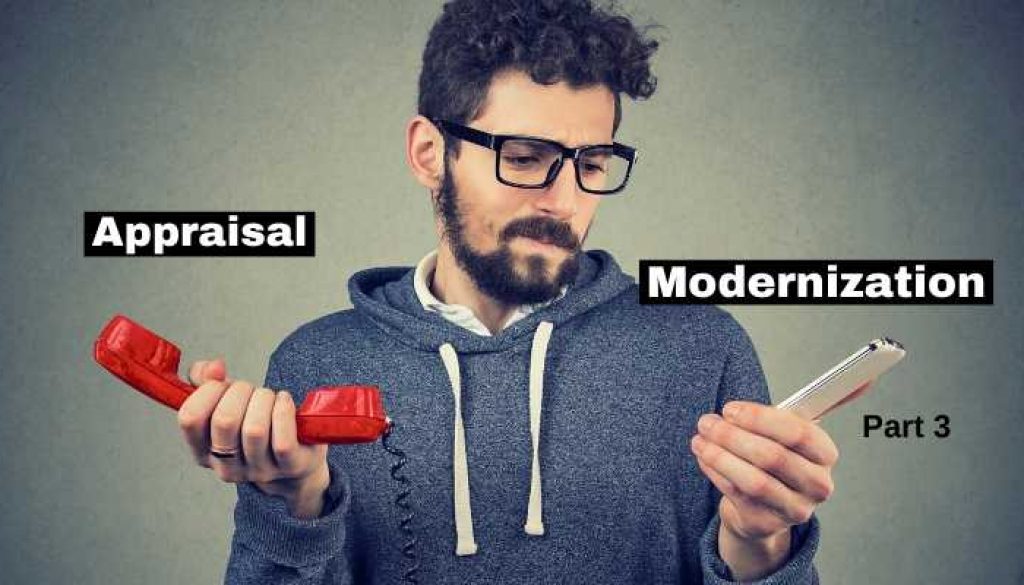[This is Part 3 of a series on Appraisal Modernization]
“Appraisal modernization” is a crisp way to describe needed change. But what is really needed?
To consider this question, in part 3, we must look at underlying motive. If we only look at the surface solution stuff, like “hybrid appraisals” we may be distracted from asking the real underlying motive and realizing the real relevant result.
There are so many alternatives to appraisal – “an opinion of value.” We have AVM (Automated Valuation Model), BPO (Broker Price Opinion), Evaluation (an opinion by a non-appraiser), and of course – anyone can have an opinion.
So, what is the underlying result needed by major valuation clients, such as Fannie Mae, Freddie Mac, VA, FHA, and the Farm Credit System? And anyone else making or guaranteeing a loan. There seem to be only three stated desires: cost, speed, and reliability.
In reality, what these clients need to know is risk of loss, balanced by the cost of the valuation and how quickly it can be obtained. AVMs are fast — a matter of seconds. BPOs are cheap. And Evaluations are also cheap, but have some other requirements of adequacy.
Let’s look at hybrids, or “bifurcated” appraisals. Mostly this concept is that a licensed appraiser sits at a desk, and relies on third-party inspection and neighborhood information, with no viewing of ‘comparables.’

The third party might be another appraiser, a sales agent, insurance adjuster, or another ‘qualified’ person. Fast, cheap, and good. Which of these three are we giving up?
Usually these are faster and cheaper, but may reflect less information of risk of loss.
Risk.
Risk of loss is the real tradeoff with cost and speed. Each of these “appraisal alternatives” are cheaper, and presumably faster. So how does this impact “appraisal modernization”?
This is the point. To modernize is to improve or reform. What our clients, our society really need from any valuation service is a measure of possible loss. Risk. Reliability.
An appraisal is only an “opinion of value.” It is a starting point for risk analysis. So, what is the real issue? The issue is that valuation services must provide more than just an opinion of ‘market value’ (a misnomer for market price). It is an opinion of market price. What else is needed?
First, what our clients and society needs is an analysis of measurable economic features, leading to an analytical result (not an opinion).
Second, market price, is often not real value of use or in use. It is not sustainable (fundamental) value. It does not plug in to forecast risk models. It does not lend itself to periodic revaluations. And it cannot be audited or reproduced!
It gets worse. The only current standard for judging an appraisal per USPAP (Uniform Standards of Professional Appraisal Practice) – is another appraiser’s opinion of the appraisal. An opinion about an opinion.
The market for valuations has desperately tried to score or rate compliance, or identify “defect rates” of appraisals – when in fact there is no potential to rate an opinion, especially from another opinion.
The test of appraisal adequacy is summed up in one word “credible” – which is defined as “worthy of belief.” Worthiness. Believability, not measurable reliability.
Ah, yes. I have performed reviews of reviews. I have formed an opinion of the worthiness of the opinion, of the worthiness of the opinion of value, of an appraiser.
All in the context of an econometric, measurable asset and measurable market information.
Appraisal modernization must integrate a risk/reliability measure into the result. An appraiser can provide an analytical result, to include a measure of reliability.
Every attempt, every new valuation regulation, product, and service has been an attempt to provide flexibility of risk entailed.
The future belongs to appraisers (or alternative valuation services) – who can provide a risk score.
Valuemetrics.info and George Dell and the Community of Asset Analysts (CAA)© are dedicated to consulting and education toward this goal.
FHFA – Federal Housing Finance Administration, Fannie Mae, Freddie Mac, FCA – Farm Credit Administration, FHA – Federal Housing Administration, VA – Veterans Administration, HUD – Housing and Urban Development, USDA, HUD – Department of Housing and Urban Development, FSA – Farm Service Agency,

May 27, 2020 @ 6:38 am
Has anyone actually developed a FICO type score for individual properties rather than for borrowers?